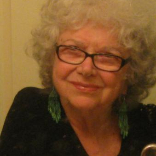Epidemic
Le Hinton
each morning Grandmom awakened
fed oak slabs to a passive stove
heat
breakfast
the surviving family
at the kitchen table she trusted King James
belief
in his god and this ravenous influenza
a life with two fewer sons
each belief burned away in a fever
each night full of reaching for tiny hands
*
each night full of reaching for tiny hands
each belief burned away in a fever
a life with two fewer sons
in his god and this ravenous influenza
belief
at the kitchen table she trusted King James
the surviving family
breakfast
heat
fed oak slabs to a passive stove
each morning Grandmom awakened
Read more »
fed oak slabs to a passive stove
heat
breakfast
the surviving family
at the kitchen table she trusted King James
belief
in his god and this ravenous influenza
a life with two fewer sons
each belief burned away in a fever
each night full of reaching for tiny hands
*
each night full of reaching for tiny hands
each belief burned away in a fever
a life with two fewer sons
in his god and this ravenous influenza
belief
at the kitchen table she trusted King James
the surviving family
breakfast
heat
fed oak slabs to a passive stove
each morning Grandmom awakened

























